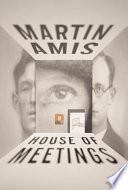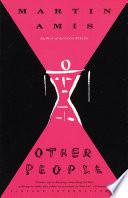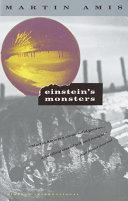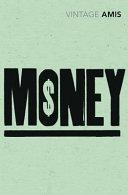"Phantom of the Opera: The Republicans in 1988" (1988)
Visiting Mrs. Nabokov and Other Excursions (1993)
Works

Experience
Martin Amis
Time's Arrow
Martin Amis
House of Meetings
Martin Amis
The Information
Martin Amis
The Rachel Papers
Martin Amis
Other People
Martin AmisFamous Martin Amis Quotes
“Bullets cannot be recalled. They cannot be uninvented. But they can be taken out of the gun.”
"Introduction: Thinkability"
Einstein's Monsters (1987)
Source: The Second Plane: 14 Responses to September 11
“He awoke at six, as usual. He needed no alarm clock. He was already comprehensively alarmed.”
Source: The Information
Martin Amis Quotes about life
“My life looked good on paper - where, in fact, almost all of it was being lived.”
Source: Experience: A Memoir
Review of Hollywood vs. America by Michael Medved, p. 16
The War Against Cliché: Essays and Reviews 1971-2000 (2001)
Review of Oswald's Tale: An American Mystery by Norman Mailer, p. 277
The War Against Cliché: Essays and Reviews 1971-2000 (2001)
Martin Amis Quotes about thinking
"Off the Page: Martin Amis" (2003)
Playboy interview (2003)
Review of Hannibal by Thomas Harris, p. 240
The War Against Cliché: Essays and Reviews 1971-2000 (2001)
"Fear and loathing" (2001)
Playboy interview (2003)
Context: I think it's a very confused culture. On the one hand, no one is better than anyone else; no one is prettier. On the other hand, everyone is completely obsessed by their looks and by how they strike the world. On the one hand, we're all equal; on the other hand, everyone's a superstar. It's all very irrational, like all ideology.
“I think it's the whole impulse to judge and censor and euphemize, that is the enemy.”
"Political Correctness: Robert Bly and Philip Larkin" (1997)
Context: I think it's the whole impulse to judge and censor and euphemize, that is the enemy. … What fun, to feel superior to T. S. Eliot. And that's the impulse that I am suspicious of.
Martin Amis: Trending quotes
“Style is not neutral; it gives moral directions.”
Novelists in Interview (1985) edited by John Haffenden
"Fear and loathing" (2001)
Context: It was the advent of the second plane, sharking in low over the Statue of Liberty: that was the defining moment. Until then, America thought she was witnessing nothing more serious than the worst aviation disaster in history; now she had a sense of the fantastic vehemence ranged against her.
"Off the Page: Martin Amis" (2003)
Context: I'd like to be remembered as someone who kept the comic novel going for another generation or so. I fear the comic novel is in retreat. A joke is by definition politically incorrect — it assumes a butt, and a certain superiority in the teller. The culture won't put up with that for much longer.
Martin Amis Quotes
"Political Correctness: Robert Bly and Philip Larkin" (1997)
Context: Philip Larkin, a big, fat, bald librarian at the University of Hull, was unquestionably England's unofficial laureate: our best-loved poet since the war; better loved for our poet than John Betjeman, who was loved also for his charm, his famous beagle, his patrician Bohemianism and his televisual charisma, all of which Larkin notably lacked.
Ten years later, Larkin is now something like a pariah, or an untouchable.
"Political Correctness: Robert Bly and Philip Larkin" (1997)
Context: The reaction against Larkin has been unprecedentedly violent as well as unprecedentedly hypocritical, tendentious and smug. Its energy does not, could not derive from literature — it derives from ideology, or from the vaguer promptings of a new ethos. … This is critical revisionism in an eye-catching new outfit. The reaction, like most reactions, is just an overreaction, and to get an overreaction you need plenty of overreactors — somebody has to do it. … I remember thinking when I saw the fiery Tom Paulin's opening shot, We're not really going to do this, are we? But the new ethos was already in place, and yes, we really were going to do this — on Paulin's terms, too. His language set the tone for the final assault and mop-up, which came with the publication of Andrew Motion's, Philip Larkin: A Writer's Life. Revolting. Sewer. Such language is essentially unstable. It calls for a contest of the passions and hopes that the fight will get dirty.
"The voice of the lonely crowd" (2002)
Context: My apostasy, at the age of nine, was vehement. Clearly, I didn't want the shared words, the shared identity. I forswore chapel; those Bibles were scribbled on and otherwise desecrated, and two or three of them were taken into the back garden and quietly torched.
Later — we were now in Cambridge — I gave a school speech in which I rejected all belief as an affront to common sense. I was an atheist, and I was 12: it seemed open-and-shut. I had not pondered Kant's rather lenient remark about the crooked timber of humanity, out of which nothing straight is ever built. Nor was I aware that the soul had legitimate needs.
Much more recently I reclassified myself as an agnostic. Atheism, it turns out, is not quite rational either. The sketchiest acquaintance with cosmology will tell you that the universe is not, or is not yet, decipherable by human beings. It will also tell you that the universe is far more bizarre, prodigious and chillingly grand than any doctrine, and that spiritual needs can be met by its contemplation. Belief is otiose; reality is sufficiently awesome as it stands.
"The Palace of the End" (2003)
Context: There are two rules of war that have not yet been invalidated by the new world order. The first rule is that the belligerent nation must be fairly sure that its actions will make things better; the second rule is that the belligerent nation must be more or less certain that its actions won't make things worse. America could perhaps claim to be satisfying the first rule (while admitting that the improvement may be only local and short term). It cannot begin to satisfy the second.
“Terrorism undermines morality. Then, too, it undermines reason.”
"The Palace of the End" (2003)
Context: Like all "acts of terrorism" (easily and unsubjectively defined as organised violence against civilians), September 11 was an attack on morality: we felt a general deficit. Who, on September 10, was expecting by Christmastime to be reading unscandalised editorials in the Herald Tribune about the pros and cons of using torture on captured "enemy combatants"? Who expected Britain to renounce the doctrine of nuclear no-first-use? Terrorism undermines morality. Then, too, it undermines reason. … No, you wouldn't expect such a massive world-historical jolt, which will reverberate for centuries, to be effortlessly absorbed. But the suspicion remains that America is not behaving rationally — that America is behaving like someone still in shock.
“People don't change or improve much, but they do evolve. It is very slow.”
"Political Correctness: Robert Bly and Philip Larkin" (1997)
Context: Feminists have often claimed a moral equivalence for sexual and racial prejudice. There are certain affinities and one or two of these affinities are mildly and paradoxically encouraging. Sexism is like racism: we all feel such impulses. Our parents feel them more strongly than we feel them; our children, we trust, will feel them less strongly than we feel them. People don't change or improve much, but they do evolve. It is very slow.
“Ten years later, Larkin is now something like a pariah, or an untouchable.”
"Political Correctness: Robert Bly and Philip Larkin" (1997)
Context: Philip Larkin, a big, fat, bald librarian at the University of Hull, was unquestionably England's unofficial laureate: our best-loved poet since the war; better loved for our poet than John Betjeman, who was loved also for his charm, his famous beagle, his patrician Bohemianism and his televisual charisma, all of which Larkin notably lacked.
Ten years later, Larkin is now something like a pariah, or an untouchable.
"Political Correctness: Robert Bly and Philip Larkin" (1997)
Context: Larkin the man is separated from us historically by changes in the self. For his generation, you were what you were and that was that. It made you unswervable and adamantine. My father had this quality. I don't. None of us do. There are too many forces at work, there are too many fronts to cover.
Still, a price has to be paid for not caring what others think of you, and Larkin paid it. He couldn't change the cards he was dealt. What poor hands we hold, when we face each other honestly. His poems insist on this helplessness...
“I'd like to be remembered as someone who kept the comic novel going for another generation or so.”
"Off the Page: Martin Amis" (2003)
Context: I'd like to be remembered as someone who kept the comic novel going for another generation or so. I fear the comic novel is in retreat. A joke is by definition politically incorrect — it assumes a butt, and a certain superiority in the teller. The culture won't put up with that for much longer.
“His indivisibility judges their hedging and trimming. His honesty judges their watchfulness.”
"Political Correctness: Robert Bly and Philip Larkin" (1997)
Context: A life is one kind of biography and the letters are another kind of life, but the internal story, the true story is in the Collected Poems. The recent attempts by Motion and others to pass judgement on Larkin look awfully green and pale, compared with the self-examinations of the poetry. They think they judge him? No, he judges them. His indivisibility judges their hedging and trimming. His honesty judges their watchfulness.
“It's been said that happiness writes white. It doesn't show up on the page.”
"The Sadistic Muse" - an interview with Laura Miller at salon.com (10 February 1998) http://web.archive.org/web/20000110052318/http://www.salon.com/books/int/1998/02/cov_si_10int.html
Context: It's been said that happiness writes white. It doesn't show up on the page. When you're on holiday and writing a letter home to a friend, no one wants a letter that says the food is good and the weather is charming and the accommodations comfortable. You want to hear about lost passports and rat-filled shacks.
"Off the Page: Martin Amis" (2003)
Context: I once wrote, in The Information, that an Englishman wouldn't bother to attend a reading even if the author in question was his favorite living writer, and also his long-lost brother — even if the reading was taking place next door. Whereas Americans go out and do things. But Meeting the Author, for me, is Meeting the Reader. Some of the little exchanges that take place over the signing table I find very fortifying: they make up for some of the other stuff you get.
"Political Correctness: Robert Bly and Philip Larkin" (1997)
Context: In Andrew Motion's book, we have the constant sense that Larkin is somehow falling short of the cloudless emotional health enjoyed by, for instance, Andrew Motion. Also the sense, as Motion invokes his like-minded contemporaries, that Larkin is being judged by a newer, cleaner, braver, saner world. … Motion is extremely irritated by Larkin's extreme irritability. He's always complaining that Larkin is always complaining.
"The Palace of the End" (2003)
Context: Saddam's hands-on years in the dungeons distinguish him from the other great dictators of the 20th century, none of whom had much taste for "the wet stuff". The mores of his regime have been shaped by this taste for the wet stuff — by a fascinated negative intimacy with the human body, and a connoisseurship of human pain.
“Sex can be funny, but not very sexy.”
"Off the Page: Martin Amis" (2003)
Context: Good sex is impossible to write about. Lawrence and Updike have given it their all, and the result is still uneasy and unsure. It may be that good sex is something fiction just can't do — like dreams. Most of the sex in my novels is absolutely disastrous. Sex can be funny, but not very sexy.
“Interacting with literature is easy.”
Foreword, p. xiii
The War Against Cliché: Essays and Reviews 1971-2000 (2001)
Context: One of the historical vulnerabilities of literature, as a subject for study, is that it has never seemed difficult enough. This may come as news to the buckled figure of the book reviewer, but it's true. Hence the various attempts to elevate it, complicate it, systematize it. Interacting with literature is easy.
"Political Correctness: Robert Bly and Philip Larkin" (1997)
Context: Viewed at its grandest, P. C. is an attempt to accelerate evolution. To speak truthfully, while that's still okay, everybody is a racist or has racial prejudices. This is because human beings tend to like the similar, the familiar, the familial. Again, I say, I am a racist. I am not as racist as my parents. My children will not be as racist as I am. Freedom from racial prejudice is what we hope for down the line. Impatient with this hope, this process, P. C. seeks to get things done right now. In a generation or at the snap of a finger, you can simply announce yourself to be purged of these atavisms.
"The Palace of the End" (2003)
Context: Like all "acts of terrorism" (easily and unsubjectively defined as organised violence against civilians), September 11 was an attack on morality: we felt a general deficit. Who, on September 10, was expecting by Christmastime to be reading unscandalised editorials in the Herald Tribune about the pros and cons of using torture on captured "enemy combatants"? Who expected Britain to renounce the doctrine of nuclear no-first-use? Terrorism undermines morality. Then, too, it undermines reason. … No, you wouldn't expect such a massive world-historical jolt, which will reverberate for centuries, to be effortlessly absorbed. But the suspicion remains that America is not behaving rationally — that America is behaving like someone still in shock.
"Fear and loathing" (2001)
Context: Violence must come; America must have catharsis. We would hope that the response will be, above all, non-escalatory. It should also mirror the original attack in that it should have the capacity to astonish. A utopian example: the crippled and benighted people of Afghanistan, hunkering down for a winter of famine, should not be bombarded with cruise missiles; they should be bombarded with consignments of food, firmly marked LENDLEASE — USA.
"Fear and loathing" (2001)
Context: The bringers of Tuesday's terror were morally "barbaric", inexpiably so, but they brought a demented sophistication to their work. They took these great American artefacts and pestled them together. Nor is it at all helpful to describe the attacks as "cowardly". Terror always has its roots in hysteria and psychotic insecurity; still, we should know our enemy. The firefighters were not afraid to die for an idea. But the suicide killers belong in a different psychic category, and their battle effectiveness has, on our side, no equivalent. Clearly, they have contempt for life. Equally clearly, they have contempt for death.
Their aim was to torture tens of thousands, and to terrify hundreds of millions. In this, they have succeeded.
“It's all very irrational, like all ideology.”
Playboy interview (2003)
Context: I think it's a very confused culture. On the one hand, no one is better than anyone else; no one is prettier. On the other hand, everyone is completely obsessed by their looks and by how they strike the world. On the one hand, we're all equal; on the other hand, everyone's a superstar. It's all very irrational, like all ideology.
“This moment was the apotheosis of the postmodern era — the era of images and perceptions.”
"Fear and loathing" (2001)
Context: This moment was the apotheosis of the postmodern era — the era of images and perceptions. Wind conditions were also favourable; within hours, Manhattan looked as though it had taken 10 megatons.
"Political Correctness: Robert Bly and Philip Larkin" (1997)
Context: In Andrew Motion's book, we have the constant sense that Larkin is somehow falling short of the cloudless emotional health enjoyed by, for instance, Andrew Motion. Also the sense, as Motion invokes his like-minded contemporaries, that Larkin is being judged by a newer, cleaner, braver, saner world. … Motion is extremely irritated by Larkin's extreme irritability. He's always complaining that Larkin is always complaining.
"The world: an explanation" in The Daily Telegraph (8 March 2003) http://webcache.googleusercontent.com/custom?q=cache:hZVARej7mn0J:www.martinamisweb.com/documents/world_explanation.doc&hl=en&gl=uk&ct=clnk&cd=1&ie=UTF-8&client=pub-4015880282924246
Context: What happened on September 11? On September 11 — what happened? Picture this: two upended matchboxes, knocked over by the sheer force of paper-darts.
Only it was much, much worse than that. In fact, words alone cannot adduce how much worse it was than that. September 11 was an attack on words: we felt a general deficit. And with words destroyed, we had to make do, we had to bolster truth with colons and repetition: not only repetition: but repetition and: colons. This is what we adduce.
“I think enlightenment is incremental, and I see it in my children.”
"Political Correctness: Robert Bly and Philip Larkin" (1997)
Context: I think enlightenment is incremental, and I see it in my children. I was six-years-old when I met a black person. My father tutored me and said, "We're going to meet two men who have black skin." And on the bus in Swansea on the way there, I accepted this and thought this would be no trouble for me. As it was, I went into the room and burst into tears and pointed at the man and said, "You've got a black face."
This wouldn't happen with my children. They've known, they've mingled with black people all their lives. This certainly is not going to occur. And so it goes on in this incremental way. … I think this is the only way it can be achieved. The trouble with proclaiming yourself to be cleansed of atavism is that it's not the case. It's an illusion. It's an illusion that can only be maintained by ideology and executive policing. It is forced consciousness. It's a lie to say, I have no racial feelings. Honesty and slow progress is a better policy, I think.
"Fear and loathing" (2001)
Context: For those thousands in the south tower, the second plane meant the end of everything. For us, its glint was the worldflash of a coming future.
Terrorism is political communication by other means. The message of September 11 ran as follows: America, it is time you learned how implacably you are hated. United Airlines Flight 175 was an Intercontinental Ballistic Missile aimed at her innocence. That innocence, it was here being claimed, was a luxurious and anachronistic delusion.
“It now seems that pornography is the leading sex educator in the Western world.”
Playboy interview (2003)
Context: It now seems that pornography is the leading sex educator in the Western world. And the idea of having your sexual nature determined by a medallion-in-the-chest-hair artist out in Los Angeles is really humiliating. I'm not talking about me, but I'm talking about my children's contemporaries, kids aged 18. They're getting their sex tips from some charlatan at Wicked Video.
"The Palace of the End" (2003)
Context: It was explained that the North Korean matter was a diplomatic inconvenience, while Iraq's non-disarmament remained a "crisis". The reason was strategic: even without WMDs, North Korea could inflict a million casualties on its southern neighbour and raze Seoul. Iraq couldn't manage anything on this scale, so you could attack it. North Korea could, so you couldn't. The imponderables of the proliferation age were becoming ponderable. Once a nation has done the risky and nauseous work of acquisition, it becomes unattackable. A single untested nuclear weapon may be a liability. But five or six constitute a deterrent. From this it crucially follows that we are going to war with Iraq because it doesn't have weapons of mass destruction. Or not many. The surest way by far of finding out what Iraq has is to attack it. Then at last we will have Saddam's full cooperation in our weapons inspection, because everything we know about him suggests that he will use them all. The Pentagon must be more or less convinced that Saddam's WMDs are under a certain critical number. Otherwise it couldn't attack him.
“And we're not going to do that.”
"Fear and loathing" (2001)
Context: Weirdly, the world suddenly feels bipolar. All over again the west confronts an irrationalist, agonistic, theocratic/ideocratic system which is essentially and unappeasably opposed to its existence. The old enemy was a superpower; the new enemy isn't even a state. In the end, the USSR was broken by its own contradictions and abnormalities, forced to realise, in Martin Malia's words, that "there is no such thing as socialism, and the Soviet Union built it". Then, too, socialism was a modernist, indeed a futurist, experiment, whereas militant fundamentalism is convulsed in a late-medieval phase of its evolution. We would have to sit through a renaissance and a reformation, and then await an enlightenment. And we're not going to do that.
"The voice of the lonely crowd" (2002)
Context: My apostasy, at the age of nine, was vehement. Clearly, I didn't want the shared words, the shared identity. I forswore chapel; those Bibles were scribbled on and otherwise desecrated, and two or three of them were taken into the back garden and quietly torched.
Later — we were now in Cambridge — I gave a school speech in which I rejected all belief as an affront to common sense. I was an atheist, and I was 12: it seemed open-and-shut. I had not pondered Kant's rather lenient remark about the crooked timber of humanity, out of which nothing straight is ever built. Nor was I aware that the soul had legitimate needs.
Much more recently I reclassified myself as an agnostic. Atheism, it turns out, is not quite rational either. The sketchiest acquaintance with cosmology will tell you that the universe is not, or is not yet, decipherable by human beings. It will also tell you that the universe is far more bizarre, prodigious and chillingly grand than any doctrine, and that spiritual needs can be met by its contemplation. Belief is otiose; reality is sufficiently awesome as it stands.
"Fear and loathing" (2001)
Context: Weirdly, the world suddenly feels bipolar. All over again the west confronts an irrationalist, agonistic, theocratic/ideocratic system which is essentially and unappeasably opposed to its existence. The old enemy was a superpower; the new enemy isn't even a state. In the end, the USSR was broken by its own contradictions and abnormalities, forced to realise, in Martin Malia's words, that "there is no such thing as socialism, and the Soviet Union built it". Then, too, socialism was a modernist, indeed a futurist, experiment, whereas militant fundamentalism is convulsed in a late-medieval phase of its evolution. We would have to sit through a renaissance and a reformation, and then await an enlightenment. And we're not going to do that.
"Political Correctness: Robert Bly and Philip Larkin" (1997)
Context: I think enlightenment is incremental, and I see it in my children. I was six-years-old when I met a black person. My father tutored me and said, "We're going to meet two men who have black skin." And on the bus in Swansea on the way there, I accepted this and thought this would be no trouble for me. As it was, I went into the room and burst into tears and pointed at the man and said, "You've got a black face."
This wouldn't happen with my children. They've known, they've mingled with black people all their lives. This certainly is not going to occur. And so it goes on in this incremental way. … I think this is the only way it can be achieved. The trouble with proclaiming yourself to be cleansed of atavism is that it's not the case. It's an illusion. It's an illusion that can only be maintained by ideology and executive policing. It is forced consciousness. It's a lie to say, I have no racial feelings. Honesty and slow progress is a better policy, I think.
“When the past is forgotten, the present is unforgettable”
Source: Other People
“Love is blind; but it makes you see the blind man; teetering on the roadside…”
Source: London Fields
“Probably human cruelty is fixed and eternal. Only styles change.”
Source: Time's Arrow
Novelists in Interview (1985) edited by John Haffenden
Source: Money
"The voice of the lonely crowd" (2002)
Source: The Second Plane: 14 Responses to September 11
Context: The 20th century, with its scores of millions of supernumerary dead, has been called the age of ideology. And the age of ideology, clearly, was a mere hiatus in the age of religion, which shows no sign of expiry. Since it is no longer permissible to disparage any single faith or creed, let us start disparaging all of them. To be clear: an ideology is a belief system with an inadequate basis in reality; a religion is a belief system with no basis in reality whatever. Religious belief is without reason and without dignity, and its record is near-universally dreadful. It is straightforward — and never mind, for now, about plagues and famines: if God existed, and if He cared for humankind, He would never have given us religion.
“When you’ve lost all your play, guess what love becomes. Work. Work that gets harder every hour.”
Source: House of Meetings
Source: Money
"Ronald Reagan" (1979)
The Moronic Inferno and Other Visits to America (1986)



